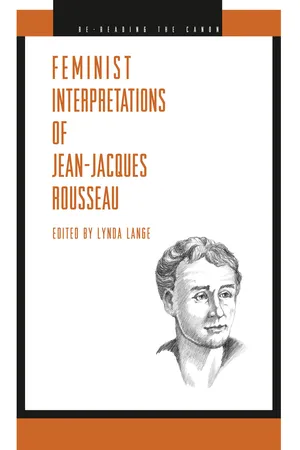
- 422 pages
- English
- PDF
- Available on iOS & Android
About This Book
A progenitor of modern egalitarianism, communitarianism, and participatory democracy, Jean-Jacques Rousseau is a philosopher whose deep concern with the relationship between the domains of private domestic and public political life has made him especially interesting to feminist theorists, but also has made him very controversial. The essays in this volume, representing a wide range of feminist interpretations of Rousseau, explore the many tensions in his thought that arise from his unique combination of radical and traditional perspectives on gender relations and the state.
Among the topics addressed by the contributors are the connections between Rousseau’s political vision of the egalitarian state and his view of the "natural" role of women in the family; Rousseau’s apparent fear of the actual danger and power of women; important questions Rousseau raised about child care and gender relations in individualist societies that feminists should address; the founding of republics; the nature of consent; the meaning of citizenship; and the conflation of modern universal ideals of democratic citizenship with modern masculinity, leading to the suggestion that the latter is as fragile a construction as the former.
Overall this volume makes an important contribution to a core question at the hinge of modernism and postmodernism: how modern, egalitarian notions of social contract, premised on universality and objective reason, can yet result in systematic exclusion of social groups, including women.
Contributors are Leah Bradshaw, Melissa A. Butler, Anne Harper, Sarah Kofman, Rebecca Kukla, Lynda Lange, Ingrid Makus, Lori J. Marso, Mira Morgenstern, Susan Moller Okin, Alice Ormiston, Penny Weiss, Elie Wiestad, Elizabeth Wingrove, Monique Wittig, and Linda Zerilli.
Frequently asked questions
Information
Table of contents
- Contents
- Acknowledgments
- Preface
- Introduction
- 1 Rousseau and Modern Feminism
- 2 Rousseau’s Political Defense of the Sex-Roled Family
- 3 Rousseau on Civic Virtue, Male Autonomy, and the Construction of the Divided Female
- 4 The Fate of Rousseau’s Heroines
- 5 Women, Power, and the Politics of Everyday Life
- 6 Developing a Feminist Concept of the Citizen: Rousseauian Insights on Nature and Reason
- 7 Empowerment Inside Patriarchy: Rousseau and the Masculine Construction of Femininity
- 8 The Politics of ‘‘Feminine Concealment’’ and ‘‘Masculine Openness’’ in Rousseau
- 9 Rousseau and the Politics of Care
- 10 Rousseau’s Phallocratic Ends
- 11 Rousseau’s Subversive Women
- 12 ‘‘Une Maitresse Imperieuse’’: Woman in Rousseau’s Semiotic Republic
- 13 Republican Romance
- 14 The Coupling of Human Souls: Rousseau and the Problem of Gender Relations
- 15 On the Social Contract
- Select Bibliography
- Contributors
- Index